
Listen to an audio version of this post at
http://media1.imbresources.org/files/127/12731/12731-71985.mp3
Back in the “olden days” — my son’s term for the ancient era when I was his age — a new book hit my high school campus like a meteor.
I was a brand-new Christian — and an ignorant one. Like other young believers at our school, I knew Jesus Christ had come into my heart and transformed my life. I wanted to share that exciting news with others. But I knew little about the Bible, its authenticity and authority, or the powerful historical evidence for its most revolutionary claim: the resurrection of Christ.
Evidence that Demands a Verdict, by Josh McDowell, one of the most dynamic Christian speakers and writers of the last generation, gave us the basic tools we needed to contend for our faith in a sometimes-hostile environment. It was a short course in Christian apologetics and we ran with it. We didn’t win every debate with skeptics and scoffers at school, but we improved our track record.
My favorite chapter in McDowell’s book is “The Resurrection — Hoax or History?” It presents in detail the case for and against Christ’s physical resurrection from biblical, historical, legal and eyewitness perspectives. The verdict: Jesus rose from the dead and is alive today.
Beyond the many biblical prophecies Christ fulfilled, the reliability of the Gospel accounts, the compelling events surrounding His death and burial and the witness of the empty tomb, there is the evidence of changed lives — from that first Easter until today — beginning with the disciples themselves.
“Perhaps the transformation of the disciples of Jesus is the greatest evidence of all for the resurrection,” John R.W. Stott observed.
McDowell quotes a portrayal of those early Christ-followers after the ignominious death of their leader at the hands of the Romans:
“On the day of the crucifixion they were filled with sadness; on the first day of the week with gladness. At the crucifixion they were hopeless; on the first day of the week their hearts glowed with certainty and hope. When the message of the resurrection first came they were incredulous and hard to be convinced, but once they became assured they never doubted again.
“What could account for the astonishing change in these men in so short a time? The mere removal of the body from the grave could never have transformed their spirits, and characters. … Think of the psychological absurdity of picturing a little band of defeated cowards cowering in an upper room one day and a few days later transformed into a company that no persecution could silence. …”
Absurd indeed, unless the living Christ appeared to them and filled them with His Spirit. They went on to turn the world upside down with their message. Most of them gladly died as martyrs. They and their successors established the Christian church, the most indestructible institution on earth. The more it is persecuted, the faster it grows.
“It was the conviction of the resurrection of Jesus which lifted His followers out of the despair into which His death had cast them and which led to the perpetuation of the movement begun by Him,” wrote Kenneth Scott Latourette, the great historian of Christianity. “But for their profound belief that the crucified had risen from the dead and that they had seen Him and talked with Him, the death of Jesus and even Jesus Himself would probably have been all but forgotten.”
Such is the power of lives changed and redeemed by the risen Christ. Your own life may be the most subjective evidence you can offer for the resurrection of Christ. But if you live in His Spirit and express His love toward others, that evidence cannot be refuted. Rejected, yes, but not refuted.
“The Lord is at work here,” a young missionary in an animist area of West Africa wrote. “He has healed many people in our village after we have prayed with them in the name of Jesus, and now our neighbors thank us for our prayers. Recently when we offered our ‘village father’ and our family chief the monthly payment for our hut in the village, our ‘father’ replied, ‘Your presence here and your prayers for the village are a gift to us.’ They would take nothing [in payment].
“Then we asked permission to celebrate Easter in the village. A large smile came upon our village father’s face as we explained that they were now our family and we wanted to celebrate this important day with them. On Easter morning when we met with the village chief and elders, we were given a goat! A feast was prepared and people from our entire village came to our compound and shared it with us. Later we worshipped under the village ‘meeting tree’ and prayed boldly in the name of Jesus for the villagers.
“Our presence and prayers are unworthy of being called a ‘gift.’ The only real gift we desire for our village is the gift that the Lord offers to them. Pray their eyes will be unveiled to the gift of life that the Lord extends to them with open arms.”
Yet the missionary’s presence is a gift, however imperfect it might be. God chooses to use it to offer His love and mercy to the village.
It is one more evidence for the resurrection — nearly 2,000 years after the event.
No comments:
Post a Comment